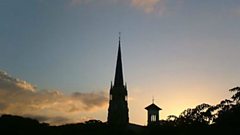Rev Dr Sam Wells - 10/12/2024
Thought for the Day
Good morning. One of the most curious events in the New Testament comes when Jesus dies on the cross. One gospel records how the rocks were split, the tombs were opened, and many bodies of the saints were raised.
I couldn’t help thinking of that scene yesterday, as victorious Syrian rebels opened the caverns of the deposed regime’s notorious Sednaya prison. Out came a bedraggled company of those virtually buried alive – a pilot who’d refused to bomb his own people, a journalist who’d criticised state corruption, a medical student who’d lost the ability to speak. One prisoner was unaware Assad’s father was not still in power.
The primal fear of being constrained by chains and swathed in darkness lies deep in our imaginations. Plato’s Republic, written two thousand four hundred years ago, describes a cave, in which prisoners are chained deep down with their backs to the entrance. Behind and above them is a fire. In front of them is a wall. Objects are held up between the fire and the prisoners. Shadows of those objects appear on the wall below.
The prisoners have no idea there’s a whole world behind, above and beyond them. All they know are the shadows they see on the wall. Plato suggests the prisoners’ reality is like human existence without education. He points out the prisoners don’t even long to leave their prison, as they have no notion of a bigger, better life.
Plato’s allegory of the cave has been adopted for many purposes besides advocating the value of philosophy. Theologians have long perceived the difference – between the shadowy quality of the cave and the bright sun of the outside world – as an analogy of the contrast between our current earthly existence and our heavenly life to come. The miserable condition of those incarcerated in a Syrian prison would thus be a metaphor for all of us this side of eternity.
In this sense the centuries-long obsession of the church with who makes it upstairs to glory and who goes downstairs to oblivion seems a vast misrepresentation of something much more profound. That’s the distinction between the limited, circumscribed existence we all know now and what I trust will be the wondrous brilliance of the eternal life that lies beyond our current reality. What might it be like to stagger out of a prison like the one in Damascus and blink at the overwhelming glory of dazzling light and indescribable beauty?
As I imagine the horrors these tortured prisoners have experienced, and share the rejoicing of families reunited with loved ones they feared long dead, I wonder, with Plato, and the gospel accounts surrounding Christ’s death, whether I’m seeing a vision of a transformation that might await us all.
Duration:
This clip is from
More clips from Thought for the Day
-
![]()
Professor Mona Siddiqui – 31/01/2025
Duration: 02:57
-
![]()
Rev Dr Michael Banner - 30/01/2025
Duration: 02:43
-
![]()
Canon Angela Tilby - 29/01/2025
Duration: 02:49
-
![]()
Rev Dr Giles Fraser – 28/01/2025
Duration: 03:16






